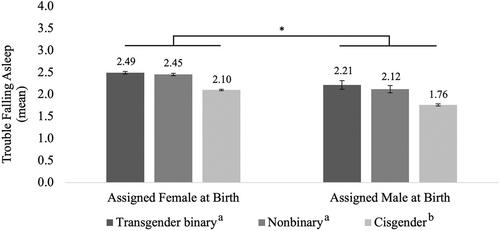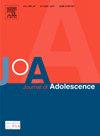Minority Stress, Resilience, and Trouble Falling Asleep Among Gender and Sexual Minority Adolescents
Abstract
Introduction
Gender and sexual minority adolescents experience greater stress and report worse sleep outcomes compared to their cisgender and/or heterosexual peers. Understanding how minority stress and resilience factors are linked to sleep health provides levers for improving sleep within these populations.
Methods
Using a cross-sectional survey of LGBTQ+ adolescents in the US conducted in 2017 (n = 11,282; Mage = 15.6 years; 65% white), we compared gender/sex and sexuality subgroups’ trouble falling asleep and conducted linear regressions relating trouble falling asleep to minority stress (i.e., violent victimization, bias-based victimization, and family rejection) and resilience (i.e., familial warmth, family acceptance, gender-affirming environments, teacher support, trusted adult at school, and presence of a gender-sexuality alliance [GSA]) factors for both gender and sexual minority adolescents.
Results
We found small but significant differences in sleep across gender/sex categories, with gender minorities and youth assigned female at birth having worse sleep than cisgender sexual minorities and youth assigned male at birth, respectively. Further, violent LGBTQ+ victimization and gender expression-based victimization were associated with more trouble falling asleep, and familial warmth was associated with less trouble falling asleep for both groups. For cisgender sexual minorities, family rejection and gender-based victimization were also linked with worse sleep while presence of a GSA and a trusted adult at school were linked with better sleep. For gender minorities, gender-segregated restroom use was also linked with better sleep.
Conclusions
Victimization prevention, increased access to school supports, and improved family connectedness may help enhance LGBTQ+ youth sleep quality and overall health.


 求助内容:
求助内容: 应助结果提醒方式:
应助结果提醒方式:


